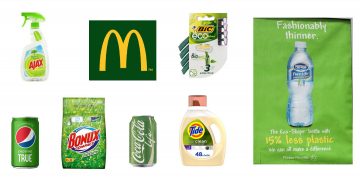In recent years, “green branding” has become a prominent marketing practice for companies around the world including Canada. Particularly in BC, shoppers witness this practice on a daily basis through many local brands via their products and services. In essence, green branding is where a company markets itself as “green” or “sustainable” whether through their trademarks, slogans, or otherwise, in order to appeal to their customers or target audience. This is contrasted with the idea of “green washing” where instead of making legitimate claims about the environment and a product or service, a company uses the idea of being “green” or “sustainable” as a deceptive marketing tactic in order to lure consumers.

Relating to our discussions in class regarding trademarks, the primary risks related to this style of branding and IP are twofold. First, as stated under S.12(1)(b) of the Trademarks Act (the “Act”), a trademark cannot be registered if they are clearly descriptive of a good or service. Second, the Act prohibits trademarks from using misleading statements under S.7.
As a result, questions arise such as:
- When do the words “green” or “sustainable” constitute something descriptive, or something that is trademarkable?
For example, is the brand Green Coffee a business name? Or is it a mere description of the coffee being environmentally considerate? Maybe the brand’s marketing colors are green and perhaps the coffee is not environmentally related at all? Would this change anything? Generally, the Act uses the standard of confusion to decide questions such as this… but in my view, the only thing confusing is how we can consistently draw such lines in green branding cases. I believe that there is heightened uncertainty for such brands to be afforded adequate protections under the act.
- When does a statement regarding “green” or “sustainable” become misleading?
In my view, the use of a green brand that does not live up to the claims it makes regarding sustainability or being green can potentially fail to satisfy the Act. In a market that puts a large importance on goods and services being green, environmentally friendly, or sustainable, exaggeration and misleading statements tend to be prominent. In cases of exaggeration of a brand’s greenness, protection under the Act could falter. That’s generally the issue… but how would we answer these questions to provide adequate certainty in the market for such brands or even emerging green brands?
More on this topic can be found here: https://www.smartbiggar.ca/insights/publication/a-fine-line-green-branding-or-greenwashing
 Copyright & Social Media
Copyright & Social Media Communications Law
Communications Law
Hi Grace,
This is such topical post after today’s trademark’s class. I also dislike how companies are jumping on the bandwagon in an effort to capitalize on the popularity of the environment.
For instance could Green Coffee get a trademark for their name – is Green Coffee just a description for environmentally considerate coffee, or would it qualify as a trademarkable brand name? After today’s class, we learned that…
S. 12(1): A TM is registrable if it is not:
(a) Primarily merely a name or surname of an individual living or who has died within 30 years (anyone in the world)– NOPE
(b) Clearly descriptive or deceptively misdescriptive in English or French of the character/quality of wares/services or of the conditions of production/persons employed in their production/place of origin (misdescriptive – consumer protection issue: monopoly prevention – descriptive ) HMMM Maybe.
I think from s12(1) b Green Coffee might have a problem, especially if it really was green.
Doris
Hello Grace,
What a great post! I have never considered the how “green branding” / “green washing” relate to trademark law!
I would have to agree with Doris for a couple of reasons (great comment by the way!). First, beyond being a not-so-clever marketing scheme, “green” or “sustainable” products have important implications for the environment and it is unfortunate to see companies disregard this and co-opt the terms in the hopes of making a profit. Second of all, based off of today’s class, it seems pretty clear that the terms “green” and “sustainable” would not qualify as trademark-able because they are clearly descriptive terms that refer to the qualify/conditions of the products (e.g., green products refer to products that are supposed to be safe for the environment).
On the other hand, could companies who actually take the “green” and “sustainable” designations seriously qualify for a passing off action against companies who do not take it seriously? For instance, could actual green companies argue, per the Andres Wines case, that by abusing the terms “green” and “sustainable” for the purposes of green-washing, these companies are misrepresenting the quality of goods produced by legitimate green brands? I assume this would require some form of authoritative body (probably the government) standardizing the “green-washing” designation process to ensure the “greenness” of a product for it to be even a semi-successful case. However, I wonder if intellectual property law could be a way to fight back against “green-washing.”
Hi Neha,
Great points! I think Consumer Protection codes as well as other protective legislation against brands using this abusive marketing tactic should address these issues as well! At the end of the day, it’s the general market and everyday consumers that are being misled. Hopefully this can all become clearer in the future!
Hi Doris! I was thinking the exact same thing – I think this highlights the importance of coming up with proper brand names that attract trademark protection rather than brand names with mere descriptive aspects like Green Coffee! There’s so many interpretations that leave the brand owners, judges (when evaluating protections), and customers (who see the brand) all confused on what is really going on. What if the coffee was just the colour green? But not green in the environmental sense? It seems topics like this are a gold mine for confusion on all ends!